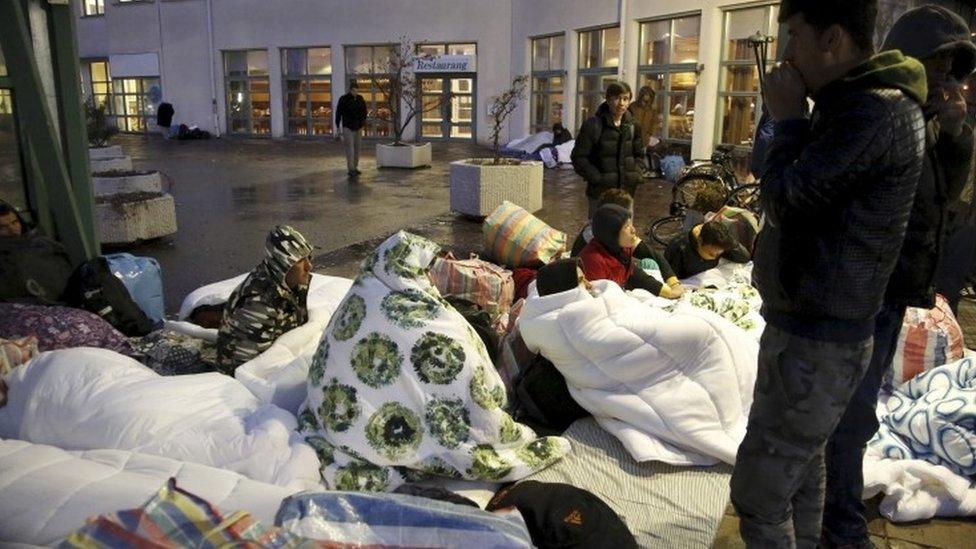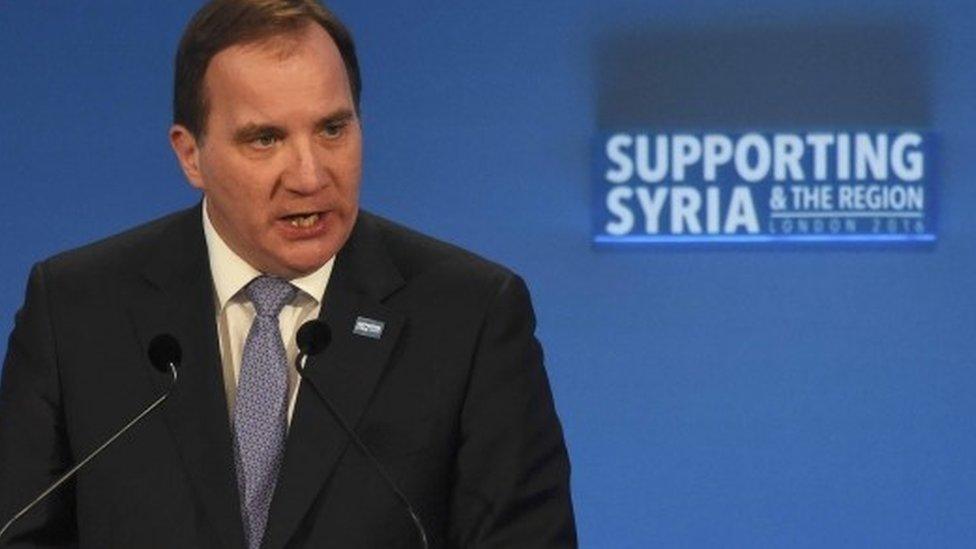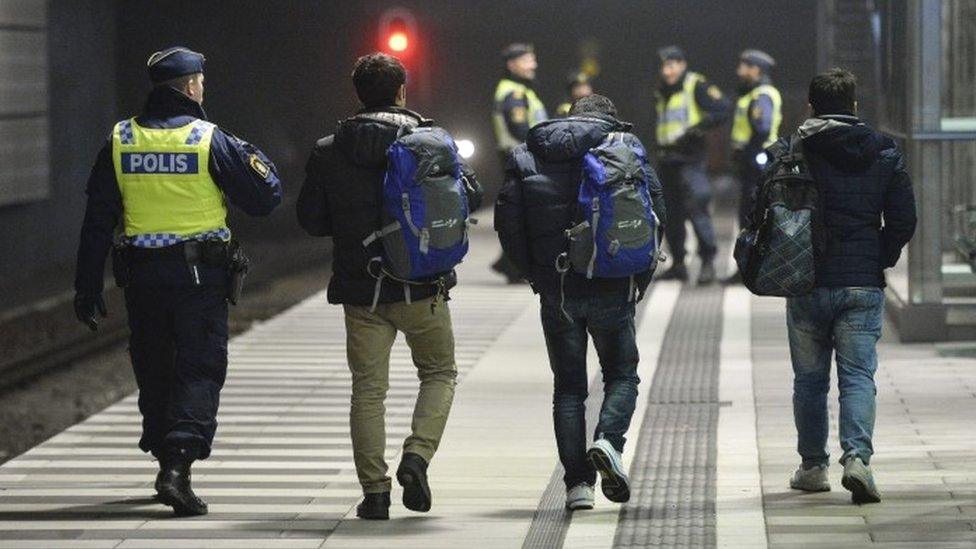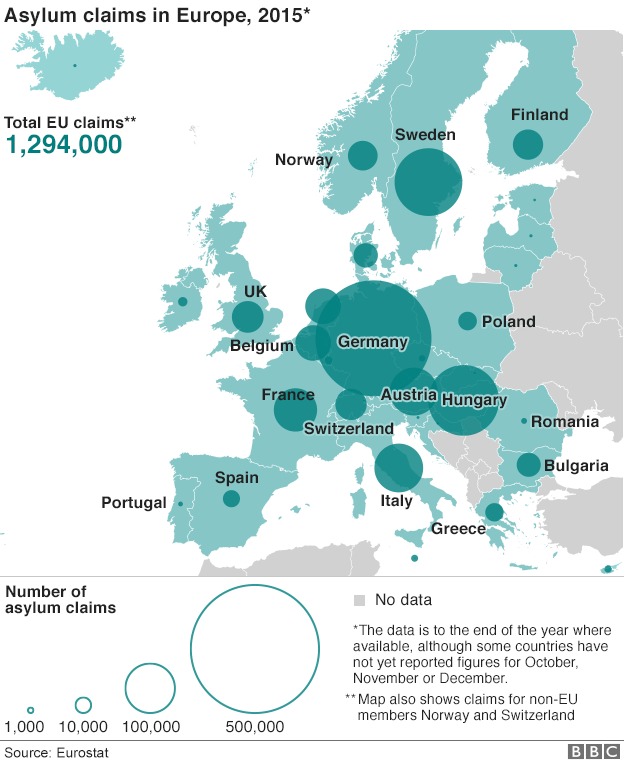Swedish government struggling over migrant crisis
- Published

More than 160,000 asylum seekers arrived in Sweden last year, more per capita than any other country in Europe
Sweden has found itself in the unusual position of being in the international spotlight in recent months.
Checks on the border with Denmark, accusations of migrant sex assaults being covered up, a killing in an asylum centre and an anti-corruption investigation into a senior politician are just some of the stories that have made headlines.
The minority government, which includes the Green Party, was elected in September 2014, and since then has been faced with managing a migrant crisis that has impacted sharply on public opinion.
A January poll put the governing centre-left Social Democrats on its lowest ratings since surveys began in 1967.
"Since the election it has been a horrifying journey," said Marja Lemne, a political scientist at the University of Stockholm.
Prime Minister Stefan Lofven once declared that "My Europe doesn't build walls." But only months later Sweden introduced border checks as it struggled to cope with up to 10,000 new arrivals every week.
Rise of anti-immigration party
More than 160,000 asylum seekers arrived in Sweden in 2015, more per capita than any other country in Europe, and far more than officials had predicted.
Magnus Hagevi, an associate professor of political science at Linnaeus University, said it is hard to judge whether a different government would have fared any better in the circumstances, but what made the current government's position particularly susceptible to criticism is the disparity between what it originally said and its current policies.
The prime minister made a speech earlier this week which focused on issues which are more traditionally associated with the Social Democrats: Care for the elderly, education and social welfare.

My Europe doesn't build walls, said Swedish PM Stefan Lofven, before his government's policy changed course
Ms Lemne called it "some kind of crisis handling" and an attempt to mobilise members of the Social Democratic party.
Jonas Hinnfors, a professor of political science at Gothenburg University, says the governing parties have also underestimated the importance of issues they have traditionally focused on, such as unemployment, welfare and schools.
He says the decline in support for the Social Democrats is part of a long-term trend, with voters being attracted to the anti-immigration Sweden Democrats, which is now the third biggest party in Sweden.
A more recent polls, external, however, suggested that tougher rhetoric from the government and the main opposition Moderate party was having the effect of reducing support for the Sweden Democrats.

Many Swedes want a more muscular approach to reducing the number of migrants
Bad communication?
Interior Minister Anders Ygeman recently caused a stir saying Sweden may reject the asylum applications of up to 80,000 migrants and should prepare to deport them.
His comments sounded harsh and some commentators put it down to a clumsy attempt at explaining how the asylum system worked.
"It might have been bad communication or he could have done it on purpose," says Mr Hinnfors.
"Who was the intended recipient of the message? Did he think of it in terms of we have to tell the general public that we are dealing with these issues, let's frame it in a slightly crude way. We come up with the 80,000 and it sounds like we are going to expel people."
Issues preoccupying the government do not begin and end with migration - among other things, there are warnings of a house price crash and the ongoing investigation into whether there was any impropriety in the way Foreign Minister Margot Wallstrom obtained a flat in Stockholm.
But few observers doubt that the way political leaders handle the migrant crisis will be of huge importance to their reputation, and the way voters respond, in the months and years ahead.


Sweden and migration
More than 160,000 asylum seekers arrived in Sweden in 2015, more per capita than any other country in Europe
By contrast, from 1850 to the 1930s, 1.5 million people emigrated
In the decades following World War Two, migrants seeking work arrived from Italy, Greece, Balkan countries and Turkey
The rise of asylum seekers began in the 1980s when Sweden saw some of its highest immigration from the Arab world, Eritrea and Somalia, as well as South American countries with repressive governments
The 1990s conflicts in the Balkans brought massive immigration, with over 100,000 Bosnians being granted asylum alongside 3,600 Kosovo Albanians
Every sixth person of the current Swedish population was born in another country
Besides numbers, the debate focuses on how best to integrate migrants from different countries into the Swedish workforce and society.
Source: Sweden official website, external
More: Listen to Keith Moore's documentary Europe: Strangers on My Doorstep - A Swedish Tale.